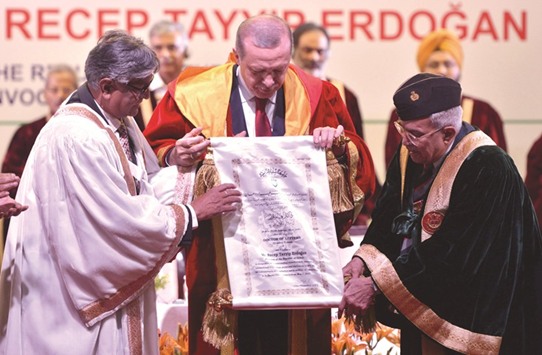India and Turkey agreed yesterday to boost trade and political ties even as Turkish President Recep Tayyip Erdogan sought India’s help to contain the network of an Islamic cleric blamed for masterminding a failed coup against Erdogan last year.
Erdogan arrived in New Delhi on Sunday night, his first trip abroad since a referendum last month in Turkey, the results of which are set to vastly expand his powers.
Three pacts - covering information and communication technology, training, and culture - were signed following talks between Erdogan and Prime Minister Narendra Modi.
Addressing the press, Erdogan and Modi underscored the need to ramp up bilateral trade, which they noted remained well below potential.
“The trade volume is at around $6.5bn and it is not enough for us. We have to increase it to at least $10bn as soon as possible,” Erdogan said.
The Turkish side pushed for a free trade agreement as well as a Comprehensive Economic Partnership Agreement (CEPA) during talks, diplomats said.
“President and I are clear that the strength of our economies presents an enormous opportunity to expand and deepen commercial linkages between our countries,” Modi said.
The prime minister said at the level of the two governments, “we need to approach the entire landscape of business opportunities in a strategic and long-term manner”.
“India and Turkey are two large economies,” he said.
Modi invited greater participation from Turkish companies in its infrastructure sector, particularly its flagship project of upgrading 100 Indian cities.
Terrorism was another key area of discussions. Turkey asked India to take action against institutions, including schools and business, affiliated with Islamic cleric Fehtullah Gulen on its soil.
Ankara blames the US-based Gulen for the coup attempt last year, accusations that the cleric has denied.
“I know that India will take necessary measures in order to expel FETO (Fetullah Gulen Terrorist Organisation) from her territories,” Erdogan said.
Erdogan said his government was extensively combating Gulen’s network - one of the “most vicious, most evil terrorist organisations of the world” - with presence in many countries across the world.
“I held an extensive conversation with the president on this subject (terrorism). We agreed that no intent or goal, no reason or rationale can validate terrorism,” Modi said.
“The nations of the world, therefore, need to work as one to disrupt the terrorist networks and their financing and put a stop to cross-border movement of terrorists,” he said.
“They also need to stand and act against those that conceive and create, support and sustain, shelter and spread these instruments and ideologies of violence.”
Modi said that he and Erdogan “agreed to work together to strengthen our co-operation, both bilaterally and multilaterally, to effectively counter this menace”.
The two leaders also discussed the need for comprehensive reforms in the UN, including the Security Council expansion, “to make the body more representative accountable and effective”.
“Both of us recognise the need for the UN Security Council to reflect the world of the 21st century and not of the century gone by,” Modi said.
Turkey’s position on India’s bid for permanent membership in the UN Security Council is different. Turkey is a member of a group of countries called Uniting for Consensus (UfC) that is opposed to expansion of permanent seats in the Security Council.
Earlier yesterday, Erdogan was accorded a ceremonial reception in the forecourt of the presidential palace. Accompanied by a 100-member business delegation, Erdogan later participated in a joint business forum.
Erdogan was also honoured with a honorary degree at the Jamia Milia Islamia University and later met President Pranab Mukherjee.

Turkish President Recep Tayyip Erdogan is assisted by officials as he displays the honorary degree he received from Jamia Millia Islamia University in New Delhi yesterday.
